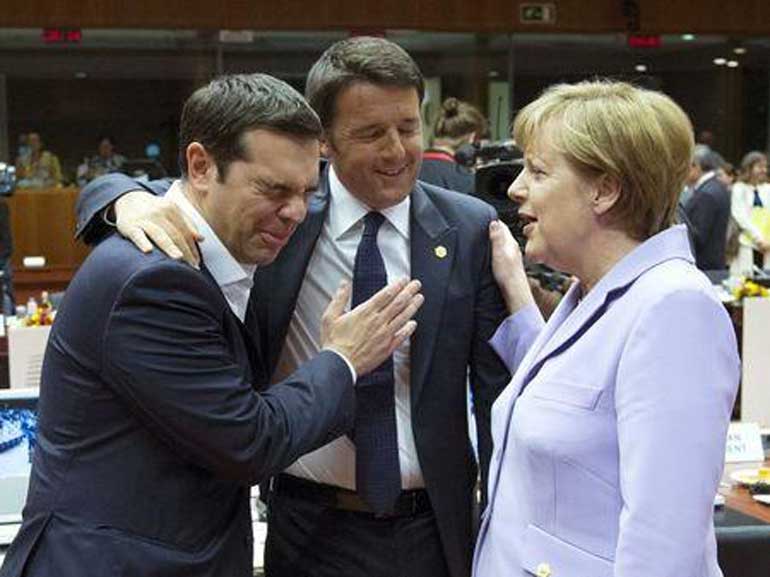Monday Mar 02, 2026
Monday Mar 02, 2026
Saturday, 27 June 2015 00:00 - - {{hitsCtrl.values.hits}}
 Greek Prime Minister Alexis Tsipras, Italian Prime Minister Matteo Renzi and German Chancellor Angela Merkel attend a European Union leaders summit in Brussels, Belgium, 25 June, 2015 – REUTERS
Greek Prime Minister Alexis Tsipras, Italian Prime Minister Matteo Renzi and German Chancellor Angela Merkel attend a European Union leaders summit in Brussels, Belgium, 25 June, 2015 – REUTERS
Greece failed again to clinch a deal with its international creditors on Thursday, setting up a last-ditch effort on Saturday to either avert a default next week or start preparing to protect the euro zone from financial market turmoil.
Euro zone finance ministers ended their third meeting in a week without agreement after the three creditor institutions put a final cash-for-reform proposal on the table in a showdown with Athens’s leftist government.
German Chancellor Angela Merkel, whose country is Greece’s biggest creditor, said Greek positions on some issues seemed even to have gone into reverse.
“The door is still open for the Greek side to come with new proposals or accept what is on the table,” Eurogroup chairman Jeroen Dijsselbloem told reporters before briefing European Union leaders, meeting at a summit next door, on the impasse.
Greece thrust its way onto the agenda of a 28-nation EU summit that had been due to focus on migration, the long-term future of the euro zone and launching a renegotiation of Britain’s membership terms.
The leaders spent two hours on an unscheduled discussion of the Greek crisis, appealing to Prime Minister Alexis Tsipras to accept the proposals on the table and spare the Greek people worse suffering, EU officials said.
Tsipras urged fellow leaders to take responsibility and not leave Greece’s fate in the hands of the International Monetary Fund, but they declined to intervene, saying the talks must be run by finance ministers, the officials said.
“The climate is that either by Saturday Greece accepts or on Saturday there will be a discussion about Plan B,” a euro zone official at the summit said, referring to measures that would be needed in the case of a default to prevent a Greek bank collapse and limit any market contagion to other euro area countries.
Greek Finance Minister Yanis Varoufakis played down the latest setback and said Athens stood by its own proposals, based largely on raising taxes and social charges that the lenders say would not raise enough revenue to plug a gaping budget hole.
“The institutions are going to look again at the two documents - our documents and their own. There will be discussions with the Greek government and we’ll continue until we find a solution,” Varoufakis told reporters.
Merkel earlier told centre-right party leaders there must be a deal before markets open on Monday, two participants said.
Her comments behind closed doors echoed the height of euro zone debt crisis talks in 2011-12, when EU leaders fearing a meltdown of the single currency held repeated weekend summits.
The sources also quoted her as telling the European People’s Party meeting that Berlin wanted a solution but would not be “blackmailed” by Greece.
Without a deal at the weekend to unlock frozen aid, Greece, which has received two bailouts worth 240 billion euros since 2010, is set to default on a crucial repayment to the International Monetary Fund next Tuesday.
That could trigger a bank run and capital controls, possibly setting Athens on a path out of the euro zone and undermining the founding principle that membership is irrevocable.
Market jitters are on a much smaller scale now than in 2012, due mostly to the European Central Bank’s bond-buying programme, and are largely confined to Greek assets.
However, many EU officials and analysts say the longer-term damage to the 19-nation single currency area from a possible Greek exit could be more profound.
After five months of acrimonious negotiations, the heads of the European Commission, ECB and IMF gave Tsipras an ultimatum to offer a credible reform plan by mid-morning on Thursday.
Instead, he arrived at a meeting with Jean-Claude Juncker, Mario Draghi and Christine Lagarde with a paper demanding an immediate commitment to debt relief for Greece, officials said.
The creditors have refused to discuss easing Athens’ debt burden until Greece has adopted and implemented the economic reforms promised under its existing bailout programme.
Diplomats said the lenders’ tactics reflected exasperation at his refusal to accept reforms of pensions, labour markets, wages and taxation, which cross his Syriza party’s self-declared “red lines”.
The mood in Brussels has swung from hope to foreboding this week but seasoned diplomats cautioned that in EU negotiations the situation often looks bleakest before a last-gasp deal.